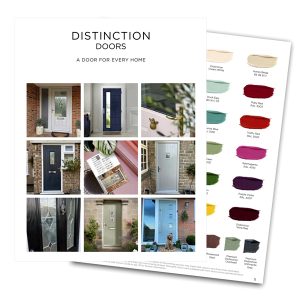Will a Composite Door Make My House Warmer?
When it comes to home improvements, energy efficiency is often a top priority for homeowners. One key area to focus on is your front door, as it can significantly impact your home’s thermal performance. Composite doors have gained popularity for their energy-efficient properties, but will they actually make your house warmer? This article explores the ins and outs of composite doors and their impact on your home’s warmth.
Understanding Composite Doors
Composite doors are constructed using multiple materials, each chosen for its specific properties. Typically, these doors consist of insulating foam, and a glass-reinforced plastic (GRP) skin. This multi-layered construction is designed to combine the strengths of each material, resulting in a door that excels in durability, security, and thermal efficiency.
Insulation Properties of Composite Doors
Thermal Insulation: One of the standout features of composite doors is their excellent thermal insulation. The core provides a robust barrier against heat loss, while the insulating foam layer enhances the door’s overall thermal performance. The GRP skin adds another layer of insulation, helping to keep your home warm during colder months.
Energy Efficiency: Composite doors are often designed with energy efficiency in mind. Many models come with energy ratings that indicate their ability to prevent heat loss. High-quality composite doors can achieve A or B energy ratings, making them a highly efficient choice for improving your home’s thermal performance.
Weather Resistance: The GRP skin of a composite door is not only strong but also highly resistant to weather conditions. It prevents drafts and water ingress, ensuring that your home remains warm and dry. This weather resistance contributes to maintaining a consistent indoor temperature, reducing the need for excessive heating.
Comparison with Other Door Types
uPVC Doors: While uPVC doors also offer good insulation, they generally don’t match the thermal efficiency of composite doors. The hollow chambers in uPVC doors provide some insulation, but they can’t compete with the solid core and multiple insulating layers of composite doors.
Wooden Doors: Traditional wooden doors can be good insulators if they are well-maintained. However, wood can warp and swell with changes in humidity and temperature, potentially leading to gaps and drafts. Composite doors, with their multi-material construction, are less susceptible to these issues.
Metal Doors: Metal doors, such as those made from aluminium, typically offer poor insulation due to the high conductivity of metal. Without proper thermal breaks, metal doors can contribute to significant heat loss, making composite doors a far superior option for keeping your home warm.
Additional Benefits of Composite Doors
Reduced Energy Bills: By improving your home’s insulation, composite doors can help lower your energy bills. With less heat escaping through your front door, your heating system won’t have to work as hard to maintain a comfortable temperature, resulting in lower energy consumption.
Enhanced Comfort: A well-insulated home is not only more energy-efficient but also more comfortable. Composite doors help to eliminate cold spots and drafts, creating a more consistent and pleasant indoor environment.
Environmental Impact: Improved energy efficiency also means a reduced carbon footprint. By using less energy to heat your home, you can contribute to lowering greenhouse gas emissions. Choosing a composite door with eco-friendly materials can further enhance this benefit.
Choosing the Right Composite Door
Energy Ratings: Look for composite doors with high energy ratings. These ratings are usually provided by independent organisations and can give you a clear indication of the door’s thermal performance.
Quality and Construction: Ensure that the composite door you choose is of high quality and well-constructed. Cheaper models may not offer the same level of insulation and durability as premium options.
Professional Installation: Proper installation is crucial to maximising the thermal efficiency of your composite door. Make sure to hire experienced professionals to fit your door correctly and seal any potential gaps.
Conclusion
A composite door can indeed make your house warmer by providing excellent thermal insulation and preventing heat loss. Its multi-layered construction, combined with energy-efficient materials, makes it a superior choice compared to uPVC, wooden, and metal doors. By investing in a high-quality composite door and ensuring proper installation, you can enjoy a warmer, more comfortable home and lower energy bills, all while reducing your environmental impact.

